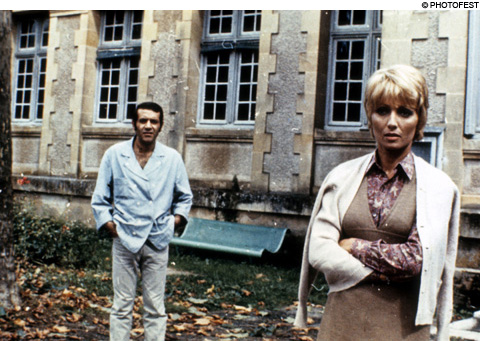
THIS MAN MUST DIE In Chabrol, murder proves a great way to meet women — in this case, Caroline Cellier. |
Like Eric Rohmer, the fellow New Wave founder with whom he collaborated on the Alfred Hitchcock study that helped launch the auteur theory, Claude Chabrol made films about people who like to talk. They talk about frustrated desires, bungled liaisons, bourgeois pleasures and vices. But one significant difference between the two filmmakers is that with Chabrol, more often than not, the discussions are resolved by murder. Such is the case especially in his earlier films, the focus of the Harvard Film Archive's abbreviated tribute of a dozen of the 50 or so works by the director, who died last September, at 80.
That book on Hitchcock makes a Hitchcockian cameo appearance in Chabrol's second film, LES COUSINS (1959; March 13 @ 7 pm). Country cousin Charles (Gérard Blain), who has taken lodgings in Paris with decadent city cousin Paul (Jean Claude-Brialy) while he studies for his law exam, thumbs through the volume in a local bookstore where he takes a break from schoolwork and Paul's exhausting nightlife. The book he ends up with is Balzac's Lost Illusions, which is as much a foreshadowing of the story's outcome as the gun on the wall in Paul's Dorian Gray–like lair. Chabrol appoints his chatty, witty morality tale of innocence and corruption, of power and submission, with exacting details and eccentric characters, not the least being Paul and his penchant for playing Wagner on the hi-fi while dressing up like a Nazi officer.
One of the less memorable characters Charles encounters in Les cousins, though, is Françoise, who's played by the æthereal Stéphane Audran. Françoise doesn't win Charles's heart, but Audran did snag Chabrol, and she would become, in true New Wave fashion, the director's muse. In LES BONNES FEMMES (1960; March 11 @ 9 pm), which is among Chabrol's greatest films, she plays Ginette, one of four funny, funky Parisian shop girls who endure tedium with talk of dreams and exasperation during business hours at an appliance store (not one customer enters during the entire film) in order to let loose in the big city at night. Their adventures range from swimming parties to casual rape, all recorded by Chabrol with an arch eye for absurdity and chaos. Battered though they are, these girls have enough innocence to hope. Ginette hopes she can exchange her dreary life for the world of show business; her roommate, Jane (Bernadette Lafont), hopes that the stranger stalking her on a motorcycle is her redeeming knight.
In his regard for the working class in Les bonnes femmes, Chabrol exhibits a rare compassion. For the wealthy and privileged, though, his gaze is merciless. In À DOUBLE TOUR (1959; March 11 @ 7 pm), one of the first films in which he shows his debt to Hitchcock, the camera zooms back from a shot of Julie (Lafont), a chambermaid who's parading about in her underwear, to pass magically through a keyhole and into the eye of Richard (André Jocelyn), the spoiled, not-quite-right scion of wealthy landowner Henri Marcoux (Jacques Dacqmine).